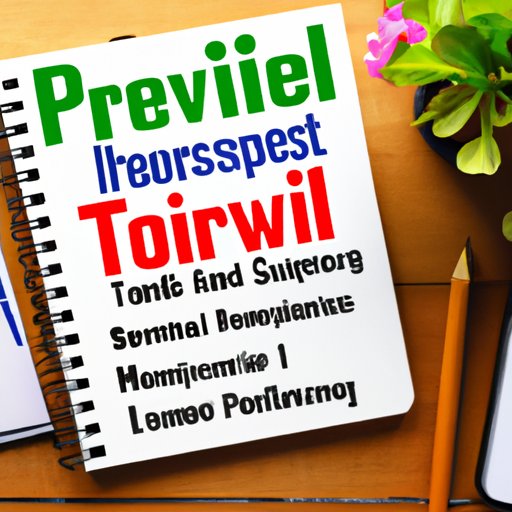I. Introduction
Personal development is the process of improving oneself in various aspects of life, including skills, knowledge, relationships, and overall well-being. It is a continuous journey that helps individuals maximize their potential, achieve their goals, and lead fulfilling lives. In this article, we will explore several tips and strategies for boosting personal development.
II. Setting Goals
Goal setting is a critical aspect of personal development. By establishing clear, specific, measurable, achievable, and relevant objectives, individuals can focus their efforts, track progress, and stay motivated. To set effective goals, consider using the SMART approach (specific, measurable, achievable, relevant, and time-bound).
It is also important to establish realistic objectives that align with personal values, interests, and strengths. Prioritize the most important goals, break them down into smaller steps, and track progress regularly. By setting and achieving goals, individuals can boost their confidence, gain new skills, and improve their quality of life.
III. Developing a Growth Mindset
A growth mindset is the belief that one’s abilities and talents can be improved through effort, practice, and learning. This mindset fosters a passion for learning, a willingness to take risks, and a resilience to overcome setbacks. To develop a growth mindset, individuals can start with embracing challenges, reframing failures as opportunities for growth, seeking feedback from others, and learning from mistakes.
By adopting a growth mindset, individuals can overcome limiting beliefs, develop new skills and talents, and pursue their goals with a sense of purpose and enthusiasm.
IV. Prioritizing Self-Care
Self-care involves taking care of oneself physically, mentally, and emotionally. It is critical for personal development, as it helps individuals maintain optimal health, manage stress, and enhance well-being. Some self-care practices include regular exercise, healthy eating, quality sleep, relaxation techniques, and social support.
Individuals can prioritize self-care by incorporating these practices into their daily routine, setting aside time for recreation and hobbies, seeking professional help when needed, and establishing healthy boundaries in relationships and work.
V. Learning New Skills
Acquiring new skills and knowledge is essential for personal development. It not only enhances one’s abilities and expertise, but also opens up new opportunities and experiences. To learn new skills, individuals can take online courses, attend workshops and conferences, read books and articles, and seek mentorship and coaching.
To make learning effective and enjoyable, individuals can set specific learning goals, break down complex topics into manageable parts, use active learning methods (such as taking notes, practicing, and teaching), and celebrate achievements along the way.
VI. Seeking Feedback
Feedback is a valuable source of information and insight for personal development. It provides individuals with opportunities to learn from others, identify areas for improvement, and adjust their behavior and performance. To seek feedback constructively, individuals can ask specific questions, listen actively to responses, thank the giver for their input, and avoid becoming defensive or discouraged.
By incorporating feedback into their personal and professional development, individuals can enhance their skills, relationships, and outcomes.
VII. Practicing Gratitude
Practicing gratitude involves recognizing and appreciating the good in life, even amidst challenges and difficulties. It helps individuals cultivate a positive and optimistic mindset, enhance relationships, and improve overall well-being. Some simple gratitude practices include keeping a gratitude journal, expressing gratitude to oneself and others, and dwelling on positive memories and experiences.
By practicing gratitude regularly, individuals can increase their resilience, reduce stress and anxiety, and embrace life with a greater sense of joy and meaning.
VIII. Identifying and Overcoming Limiting Beliefs
Limiting beliefs are negative or self-sabotaging thoughts that prevent individuals from reaching their full potential. They can arise from past experiences, social conditioning, or unrealistic expectations. To identify and overcome limiting beliefs, individuals can challenge their assumptions, reframe their thoughts in a positive manner, seek evidence and support for alternative beliefs, and celebrate incremental progress towards their goals.
By overcoming limiting beliefs, individuals can unleash their creativity, confidence, and resilience, and achieve success beyond their expectations.
IX. Conclusion
Personal development is a journey of growth, learning, and self-improvement. By setting goals, adopting a growth mindset, prioritizing self-care, learning new skills, seeking feedback, practicing gratitude, and overcoming limiting beliefs, individuals can enhance their abilities, relationships, and overall well-being. Remember to be patient, persistent, and proactive, and never underestimate the power of personal development in transforming your life.
(Note: Is this article not meeting your expectations? Do you have knowledge or insights to share? Unlock new opportunities and expand your reach by joining our authors team. Click Registration to join us and share your expertise with our readers.)
